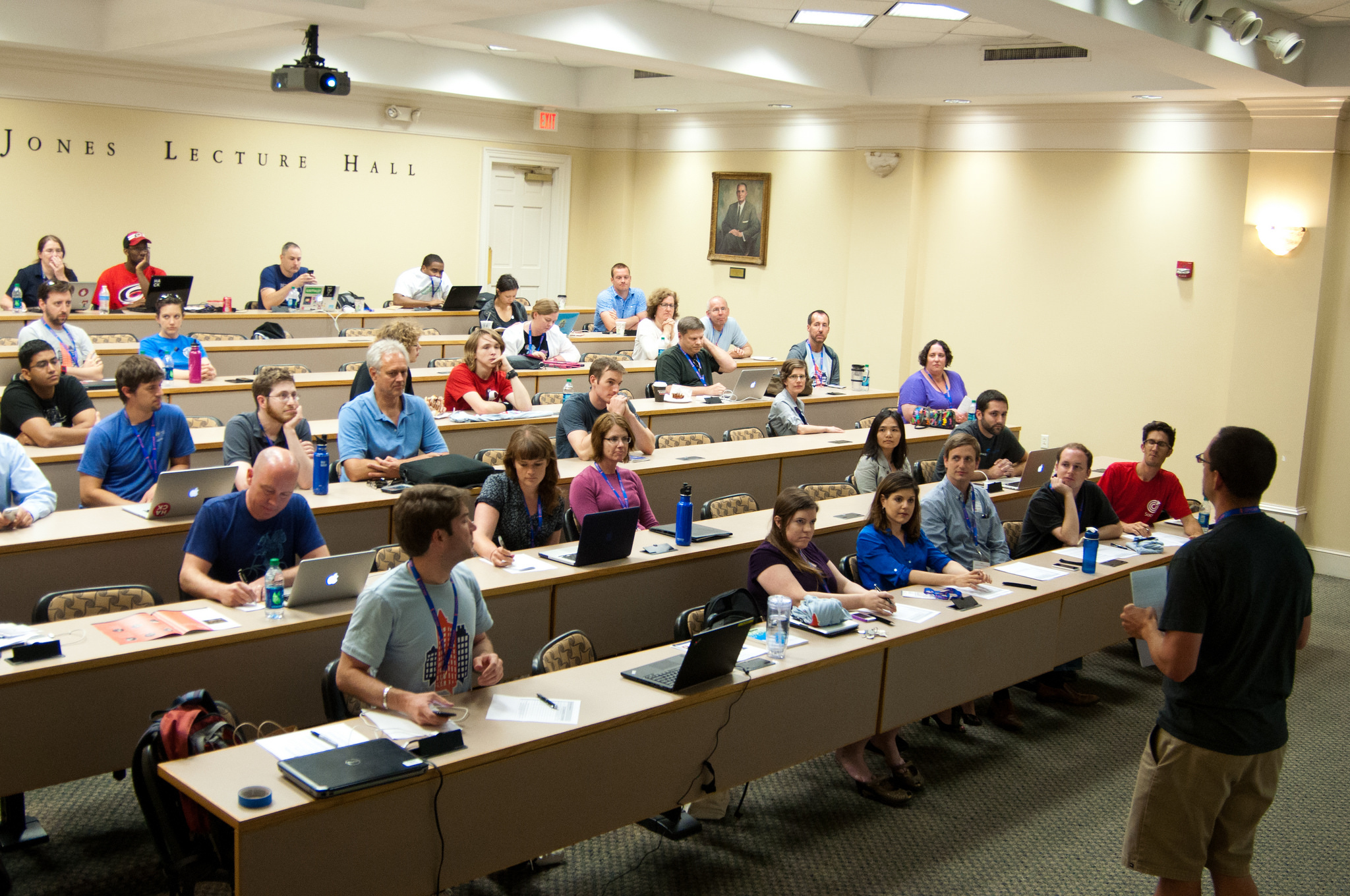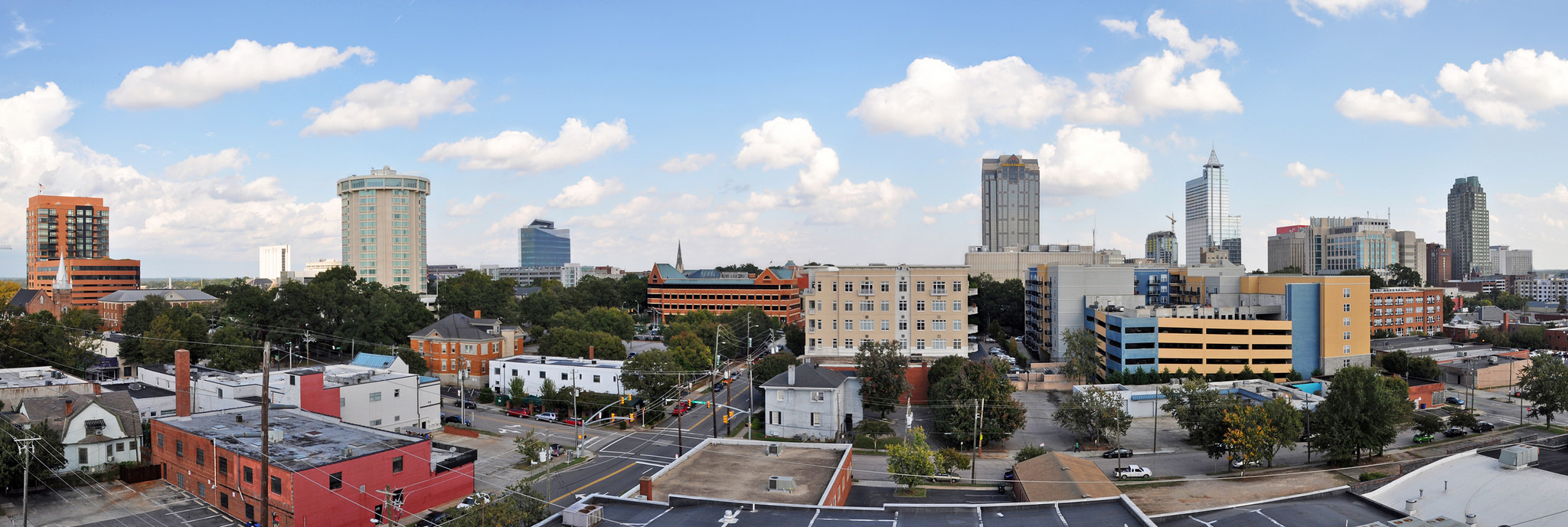Connecting state and local government leaders
Building off successful cross-sector collaboration, public and private partnerships are pushing North Carolina’s capital city forward.
How does a successful city like Raleigh, North Carolina, connect its thriving tech sector, public projects and infrastructure through effective partnerships between citizens and government? In the first of occasional series of guest articles, Route Fifty asked Jedidiah Gant, a digital urbanist with New Raleigh, and Bonner Gaylord, a member of the Raleigh City Council, to detail the formula that’s been working for their city.
RALEIGH, N.C. — The City of Oaks is a city with a world-class park, trees, trees and PhDs.
The collaborative spirit abounding in North Carolina’s capital city is the natural outcome of pairing traditional Southern hospitality with the talent being pumped out of three tier-1 research institutions in or near Raleigh: North Carolina State University, the University of North Carolina and Duke University.
Because of these institutions and the growing buzz around Raleigh, the city and “Triangle,” as a whole, are becoming familiar to lots of current urban and cultural influencers.
Still, for many people across the country, Raleigh is a new city. Despite being named as the capital of North Carolina in 1788, it has only recently been gaining steam and national press over the past 10 years.
Raleigh’s former mayor, Charles Meeker, put in place a few public works and urban projects that have spawned an urban renaissance in the city center. Residents young and old are flocking from other states and nearby cities to live in the “New Raleigh,” which is full of history and rich with potential. It has a lot of room to grow and is doing so in a smart, progressive and calculated way.
Raleigh has been named to many Top 5 lists in national publications over the past few years, from cultural mavens like BuzzFeed to leaders of the business industry like Forbes. The population of Raleigh continues to grow, and new urban apartment buildings are sprouting up like wildflowers.
But Raleigh’s brand does have a bit of an identity issue. Although it is a self-sustaining, growing metropolis, Raleigh is often called Raleigh-Durham, Raleigh-Cary, Raleigh-Durham-Chapel Hill or a handful of other combinations.
While these connections are understood geographically, the city of Raleigh is developing in a handful of sectors that, over time, will allow it to outgrow this connection to surrounding jurisdictions and become a thriving metropolis on its own.
These sectors range from Big Public, including government and academia, to Small Public, which includes ways that open-sourced projects establish themselves in the local community.
These projects, both big and small, define ways that public projects and infrastructure can involve partnerships between citizens and government. On the opposite end of the spectrum is Big Private, which includes businesses and non-profits, and Small Private, which refers to the growing industry of citizen-led initiatives. For the sake of simplicity, we will refer to academia and government as public and nonprofits and business as private.

CityCampNC in Raleigh in May 2014. (Photo courtesy Leo Suarez)
In the public realm, Raleigh is developing new ways to work on both Big Public and Small Public levels. From the Open Raleigh data portal on a government level to the citizen-led City Camp initiative that spawns new urban technology products each year. From large research universities like N.C. State, who are making major advances in the innovation sector, to small groups focused on creating innovation with public funding and support.
Raleigh’s current Mayor Nancy McFarlane, along with several Raleigh City Council members, have championed this new tech growth industry through the creation of new jobs in the government such as an innovation and entrepreneurial manager and the development of innovation promotional platforms like Innovate Raleigh.
In a future guest article, we will outline these promotional platforms, how they started and what they plan to accomplish in the coming years as we make way for Google Fiber and other new tech industries that continue to court Raleigh as their future headquarters.
One of the largest growing sectors is the Big Private tech industry. Raleigh has a rich tech history that dates back to the mid-1900s but continues to find new ways to be innovative and attractive to businesses and workers alike.
Later, we will also look into the history of the area’s tech industry and how it has changed over the years from big tech to government championed sectors to citizen-led initiatives. The tech industry in Raleigh has its roots in Research Triangle Park (RTP), an area just outside the Raleigh city limits that Durham, Morrisville, Raleigh and Cary all claim as a piece of their own urban fabric.
SAS set up its headquarters in RTP in the 1970s, expanding on the brand of the area and bringing engineers and workers from all over the globe. It is regularly listed as one of the best companies to work for in the United States and continues to create innovative products for its clients.
Later in our series of guest articles, we will look further into RTP’s history and how it was the catalyst for this area to become a hotbed for technology innovation over the past 50 years.
While RTP continues to thrive on the outer edges of the city and is poised for a large-scale expansion in the next few years, much of the recent growth in the Raleigh tech sphere has happened in the center of the city.

A view of downtown Raleigh (Photo by Flickr user James Willamor via CC BY-SA 2.0)
Downtown Raleigh has become home to multiple large tech companies and has a growing citizen entrepreneur community. The number of incubators has increased greatly over the past 5 years, and internationally known companies like Citrix and Red Hat now call Downtown Raleigh their home. We will lay out these initiatives from big data and big tech to how they are changing the way many citizens interact with their city.
Finally, we will discuss a few Small Private projects led by citizens and championed by government that are tackling current urban issues. Many of these can be referred to as “creative urbanism” projects. From a network of making Raleigh more walkable through DIY signage and QR Codes, to an app that maps out our local greenway system, to larger infrastructure models that propose new ways to improve civic engagement through technological interventions throughout the city, and a proposal to integrate Google Fiber to create new “sub-urban fiber cities” along the path of heavy rail.
These projects along with other initiatives to form food corridors, pop-up beer gardens and the regular tech-industry meetups continue to push our city forward to new ways of looking into urban life and the relationship between government, technology and citizens.
From grassroots ideas to the big data products, Raleigh is poised to become a city that looks at the relationship between technology and government in a new way. We are making efforts to increase transparency and allow citizens to present issues in new ways to have their voices heard and their ideas pushed forward.
We are a smart city with a lot of smart leaders and citizens. As we continue to leverage our tech history with our new population, full of new ideas and new citizens, Raleigh will become a progressive 21st century city that other cities admire.
Raleigh's success is the result of collaboration between governments, business, nonprofits, and academic sectors. If there is anything that Raleigh can teach other communities, it is that partnerships are the key to success.
Jedidiah Gant is a digital urbanist in Raleigh, N.C. Bonner Gaylord is a member of the Raleigh City Council.

NEXT STORY: Pittsburgh’s Innovation Chief Pushes a Big Municipal ‘Cultural Shift’



